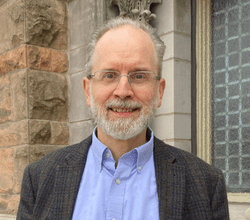
Saint Paul Seminary director of counseling services and assistant director of human formation Paul Ruff says he has “the best seat in the house” when it comes to priests growing even after ordination.
Briefly:
- Priests are embracing counseling and wellness for mental health support.
- Seminary retreats promote vulnerability, fraternity, and spiritual growth.
- Addressing isolation and burnout is crucial for priestly well-being.
- Ongoing formation continues human and spiritual development after ordination.
Early during The Saint Paul Seminary’s 30-day renewal retreat for priests this past summer, seminary director of counseling services Paul Ruff asked the 12 men in attendance how they were doing so far.
“I’m kind of anxious,” one of them admitted. “I’m kind of scared.”
“Why?” asked Ruff, also the seminary’s assistant director of human formation.
“Because I’m not used to being this vulnerable with my brother.”
That edge between attractive and risky, Ruff says, is where true human growth happens.
The 68-year-old Twin Cities native is an expert. As a licensed psychologist, he’s spent decades helping people – most recently, seminarians and priests – overcome the mental health challenges currently running rampant in the United States.
He’s watched as a new generation of priests has embraced things like counseling, wellness coaching and deep, long retreats – not just for themselves, but for their parishioners.
“For any of us, saying ‘I’m weak, and I need assistance,’ there’s just a natural stigma of human pride in that for me, for you, for any of us at times,” Ruff said. “But I think the idea that I’ll be frowned upon by my [fellow priests], I think that’s really gone away.”
It’s why about a dozen local priests take part in counseling with Ruff and his team of psychologists at The Saint Paul Seminary. It’s why dozens more show up for Institute for Ongoing Clergy Formation events and hear Ruff speak on the importance of priestly fraternity and tips for prioritizing a priest’s overall well-being.
“I don’t have the illusion that we’ve arrived, but it seems like we’re paying the right kind of attention, and we’re willing to learn as we go.” — Paul Ruff, Saint Paul Seminary director of counseling services

counseling services at The Saint Paul Seminary.
And it’s why the institute hopes to replicate the priestly renewal retreat, which provided shepherds from the Archdiocese of St. Paul and Minneapolis and the Diocese of Winona—Rochester a month of deep, fruitful human and spiritual growth. Ruff says he’s already spoken with leaders from other dioceses who want something similar for their priests periodically.
According to the National Institute of Health, one in six Americans lives with some form of mental illness. Whether or not a parish priest has been diagnosed, there’s a high risk of stress and burnout – priests risk living frantic, isolated lives and turning to less-than- healthy means of coping with the fallout.
It can be a contributing factor to horrors like the clergy abuse scandal that’s rocked the U.S. Church.
But Ruff sees the tide turning.
“I don’t have the illusion that we’ve arrived, but it seems like we’re paying the right kind of attention,” Ruff said, “and we’re willing to learn as we go.”
That doesn’t just mean priests showing up for counseling every week or month. Man is not meant to be alone, and diocesan priests are no exception.
It’s often isolation that can have the most negative consequences. Which is why Ruff is a huge advocate of priests living in community.
“If [ongoing formation work] doesn’t increase presbyteral fraternity, then don’t do it,” Ruff says.
In a trend dating back to directives from St. John Paul II, the top seminaries have implemented robust human formation initiatives – including mental health services for men discerning to be priests. There’s a keen recognition, though, this formation doesn’t end at ordination.
In many ways, it’s just beginning.
“There’s a way in which we’re all called to grow, not just to function,” Ruff said. “I think I’ve got the best seat in the house. It’s just a lot of beautiful things happening.”
